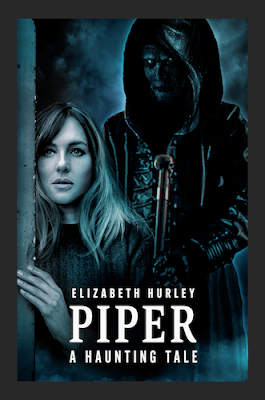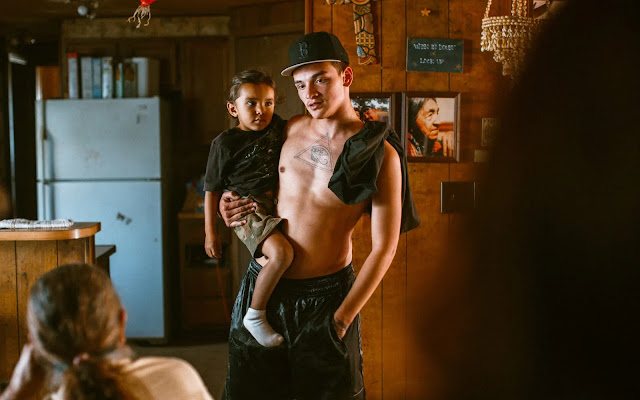Director: Anthony Waller.
With: Elizabeth Hurley, Mia Jenkins, Jack Stewart, Robert Daws.
USA 2023. 105 mins.
In a German town full of cliches and random accents, the malevolent spirit of the fairy tale that made it notorious turns out to be true. Sort of. With a constantly declarative tone, many scenes are just plonked next to each other without much flare. Elizabeth Hurley's performance wings between knowingly camp and embarrassing, but she does self-flagellate onscreen as penance. It’s Mia Jenkins that is the best in show.
It was hard to tell if the audience was laughing at or with, but as a chunk of crew was in the audience, I am guessing towards the latter. Certainly, a CS Lewis wardrobe gag during the closing credits imply deliberate. But it is naff, doesn’t do much with its threat to all the town’s children, and certainly can’t be taken seriously.
Director: Barnaby Clay.
With: Scott Haze, Kate Lyn Sheil, Alex Montaldo, Charlie Avink.
USA 2023. 94 mins.
A man finds himself in a massive hole in the ground with a reticent woman and savage boys above and no way out. Scott Haze, who essentially has to carry the film, is excellent. It's a bad title that gains credence when you know what it refers to. It's a Descent Into Hell narrative strung out on mystery and a few shocks as Haze goes from hints of entitlement to scraps of what he used to be, never quite knowing that he's fated as soon as he offered help to a child seemingly lost in the wild. The slow burn keeps up the disquiet, but it's a film of a stunning rock-face that never stops being awe-inspiring.
Although the film tries to hold its cards close to its chest, if you do guess what's happening, the inevitability is still unsettling. The boys are allowed to roam free and do and get away from anything, to indulge in predatory and sadistic play, and any dissenters will not be tolerated (they're a bit 'Mad Max' delinquents). Women are baby-machines that are the ones that tragically uphold these traditions. Again, perversion of gender roles and homemade family traditions/religions make families the most dangerous places. The film offers no more than an extreme version of somewhat conservative norms (women the homemakers while men go play). Accusations of misogyny don't quite hold water because this is the very core of the film's horror. Ignorance itself is the main source of this horror.
And on the other hand, it is refreshing to see a man being manipulated, caged, abused and impotent for once instead of a woman suffering. It's a folklore horror cosmos where you may just find yourself in someone else's crazy plans, and that alone continues to be one of the essential themes and bedrocks of horror.
Director: Sébastien Drouin.
With: Allen Leech, Nina Bergman, Yan Tual, Sydney Hendricks.
UK/Canada 2023. 90 mins.
After an initial twist, a chamber piece of killer and victim in a car, stranded in a blizzard, offers two great performances with a decent script and a lot of enjoyable detail about their predicament.
If the supernatural element seems like a deux ex machina, even if foreshadowed, and there may be a little cultural appropriation here, but this doesn't scupper the good work that has gone before. A relatively smart and entertaining thriller.
Director: Paris Zarcilla.
With: Jaeden Paige Boadilla, Max Eigenmann, David Heyman, Leanne Best.
UK 2023. 99 mins.
A film where the Gothic House tradition is seen through the Filipino staff, and in that way achieves both a lot of genre subversion and social commentary. And seeing through this lens also makes sense of why the English characters are verging on grotesques: if it's a little broad, that arguably fits with the Gothic melodramatic custom (even look to 'Cobweb' for comparison to horror parallels). The four leads are exceptional: Jaeden Paige Boadilla is especially endearing and disarming as Grace.
Jon Clarke's score makes sure the Fillipino roots are always foregrounded - and this is how you end a film on a dance number. Paris Zarcilla (in the FrightFest Q&A) talks of the rage that fueled the script, the anger he felt when during Covid, how Filipinos were staffing the NHS and yet the British government committed more and more to demonising immigrants. It was this anger echoed by the other crewmembers and this aspect that evidently greatly moved much of the audience. Indeed, the choir that we see at the end are all NHS workers which only seemed to add to the poignancy. Again, adding increasingly diverse viewpoints to familiar tropes only reveals how potent genre is for expressing and exposing rage and social injustice. And yet, Zarcilla talked of getting past this to get to the joys of life, and to that end the film never feels despairing and this agenda is captured in the final musical sequence. In this way, the film achieves its goal and ends up unexpectedly moving and deeper than its surface pleasures.






.png)
.png)
.png)
.png)
.png)
.png)
.png)
.png)
.png)
.png)
.png)
.png)





